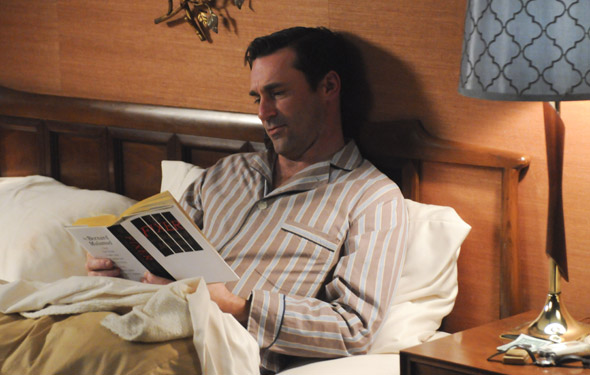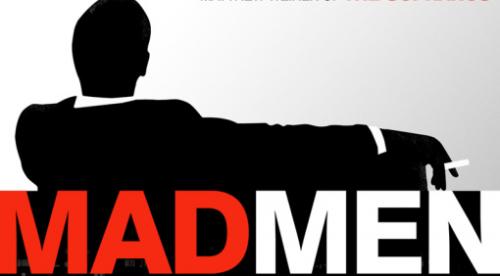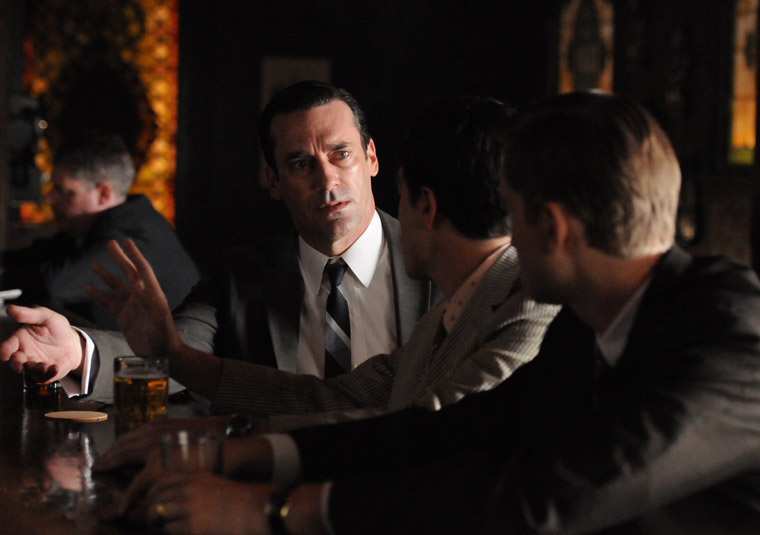"Everything you think’s going to make you happy just turns to crap."
 Last week, Megan was annoyed with the Jaguar ad campaign. A wife is a Buick in the garage, she said with a touch of bitterness, but a mistress is an exotic and temperamental Jaguar. I don't know what kind of car Don Draper drives these days, but it's not a Jaguar, and at the end of Commissions and Fees, the person driving that ordinary car was the only one who was happy.
Last week, Megan was annoyed with the Jaguar ad campaign. A wife is a Buick in the garage, she said with a touch of bitterness, but a mistress is an exotic and temperamental Jaguar. I don't know what kind of car Don Draper drives these days, but it's not a Jaguar, and at the end of Commissions and Fees, the person driving that ordinary car was the only one who was happy.
Rest in peace, Lane Pryce.
I've been doing this recap dance long enough to know that even when I imagine I have nothing to say, there are plenty of words to come. Yet I am in the strange position of feeling that the very act of writing is disrespectful to what I have just seen. Lane felt, tonight, like a person, not a character. A person we lost. A person Don tried desperately to treat with dignity. A person who deserves, not a recap, but a eulogy.
Rest in peace, Lane Pryce.
The things we want, the magical, out-of-reach things, they just don't work. Glen knew it, in the end, as quoted above. Don pitched the living shit out of Dow Corning. He pitched desire. He pitched never being happy enough as a net positive, as a sign of life. McManus (the current agency) is just bringing them happiness, just bringing them success, but Don insists that's not enough.
In Episode 5.01, A Little Kiss Part 1, Trudy said to Pete, "Dissatisfaction is a symptom of ambition." This is, essentially, Don's pitch: "What is happiness? It’s a moment before you need more happiness."
The magical, impossible, unmanageable thing, the thing we think we want but which cannot satisfy us, is clearly represented by Jaguar. That's the pitch. Remember last week: "If they weren’t temperamental, if they weren’t beyond our reach and a little out of our control"? Jaguar is so fundamentally unsatisfying you can't even kill yourself in it. Poor Lane, so desperate, and relying on such notoriously shoddy engineering. Watch the failed attempt:
The clip is funny, and its bona fides have been fully established, with the two prior episodes making sure we understand that Jaguars just don't start. It's also tragic, since lousy English technology won't stop Lane, who loves the U.S. and weeps that he will lose his visa—he kills himself instead in an office lavishly decorated in Americana. The position in which he hung himself meant that one of his last sights was his replica of the Statue of Liberty. Ah, Lane, the American Dream failed you, and you didn't even enjoy that moment before you needed more happiness.
Don will blame himself, you can already see that. He has shame and remorse all over his face when he hears the news. Last week, Joan touched him kindly and said, "You're a good one." It's likely he married Megan because she believed he was good, but it's the one thing he never believes of himself. He often does terrible things, but Megan was right in Tomorrowland, he always tries to do better.
How impotent his efforts to do good must feel to him now; that much is obvious in the bitter way he condemned the partners for voting last week without him: "Should I leave so you all can do whatever you want?" he pointedly asks.
He couldn't save Joan from Herb. He couldn't save Lane from himself. In the back of his mind, always, is that he couldn't save Adam (his brother, who hung himself in Season 1), and probably that he couldn't save the real Don Draper (whose death can be blamed on Dick Whitman). The only one he could save was Glen Bishop, for whom he could fulfill a simple wish. "We’re worried about you," he said of young people in Episode 5.03, Tea Leaves. He can't prevent Sally from becoming a woman (and "spreading her legs to fly away" as Emile Calvet would have it), or save lives that should be saved. But he can take Glen driving. Sometimes we can only do little things.
Megan, too, is intensely protective of children, protecting Glen, she says, because she wasn't able to protect Sally. Substituting a lesser form of protection for a more necessary one is a motif this episode.
But instead of talking about themes or motifs, I would rather describe streams: two directions in which this episode flows. One is towards dissatisfaction, dissolution, and death, the other is towards life, rebirth, and becoming. Creation and destruction, momentum and inertia: the two great forces of life. Don tried to talk to Lane about starting over, and in fact, I think Don was as kind as humanly possible. When he says, "I’m doing the most decent thing I could possibly do," he is telling the truth. But Lane is not flowing towards rebirth as Don advises, he is unwinding, and the only kind thing Don can do is lay Lane gently to rest on the couch.
Sally, on the other hand, flows towards rebirth as a woman. Her first "date" with Glen may not have been very romantic, but it was very satisfying for her (until it became too much, physically and metaphorically). Her movement towards sexuality, innocent as it is, is life-affirming, just as Roger's boredom with sex is life-denying. Roger, whose enlightenment "wore off," is in the stream of dissolution with Lane.
There are a lot of ways to talk to a young girl about her first period. What Betty said was lovely, and also important; she talked about babies, and about a healthy body, and about Sally joining in the grand cycle: the stream of becoming that will come around to Sally's someday being in the mother role that Betty is in today. Ask any mother—when we have children of our own, our relationships with our own mothers are transformed. Betty, with her arms around Sally, sees Sally becoming herself, sees her own mother and her future granddaughter in a stream as circular as Betty's arms when they envelop her daughter.
Easter is mentioned several times, and Lane specifically talks about resurrection to Joan—all this while snow is visible through the window. Winter and spring. Death and rebirth.
Rest in peace, Lane Pryce.
Some additional thoughts:
- Suicide has been foreshadowed heavily all season. In this episode, it was Betty's turn: "I wanted to know if you would have any problem with me strangling Sally." Sally, of course, is not the one who ends up strangled.
- Betty's could be the quote of the week, but instead I'm giving it to Kenny: "I don’t mind waiting 20 minutes for an unspecified meeting with my boss. I mean, it’s not like your imagination would run wild."
- For her museum date, Sally wore the go-go boots Megan had bought her in At the Codfish Ball: the boots that Don made her take off because they were too mature.
- The drive from Park Avenue to Hotchkiss Academy in Lakeville, Connecticut is just about 100 miles each way.
Deborah Lipp is the co-owner of Basket of Kisses, whose motto is "smart discussion about smart television." She is the author of six books, including "The Ultimate James Bond Fan Book."
Watch Mad Men Moments, a series of videos on Mad Men, produced by Indiewire Press Play.

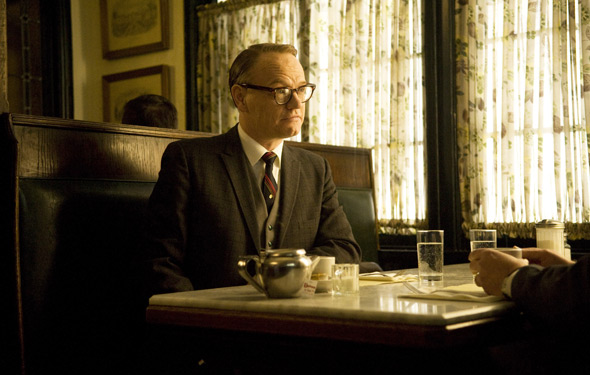
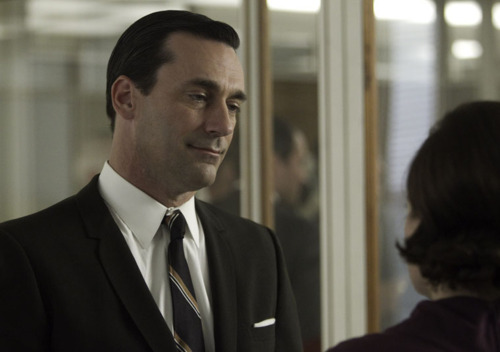



 But listen to the color of your dreams
But listen to the color of your dreams